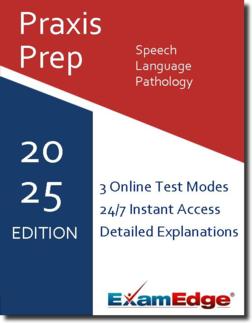Praxis Speech-Language Pathology (5331) Practice Tests & Test Prep by Exam Edge - Topics
Based on 29 Reviews
- Real Exam Simulation: Timed questions and matching content build comfort for your Praxis Speech-Language Pathology test day.
- Instant, 24/7 Access: Web-based Praxis Speech-Language Pathology practice exams with no software needed.
- Clear Explanations: Step-by-step answers and explanations for your Praxis exam to strengthen understanding.
- Boosted Confidence: Reduces anxiety and improves test-taking skills to ace your Praxis Speech-Language Pathology (5331).

Understanding the exact breakdown of the Praxis Speech-Language Pathology test will help you know what to expect and how to most effectively prepare. The Praxis Speech-Language Pathology has 132 multiple-choice questions The exam will be broken down into the sections below:
| Praxis Speech-Language Pathology Exam Blueprint | ||
|---|---|---|
| Domain Name | % | Number of Questions |
| Foundations and Professional Practice | 33.3% | 44 |
| Screening, Assessment, Evaluation, and Diagnosis | 33.3% | 44 |
| Planning, Implementation, and Evaluation of Treatment | 33.3% | 44 |


